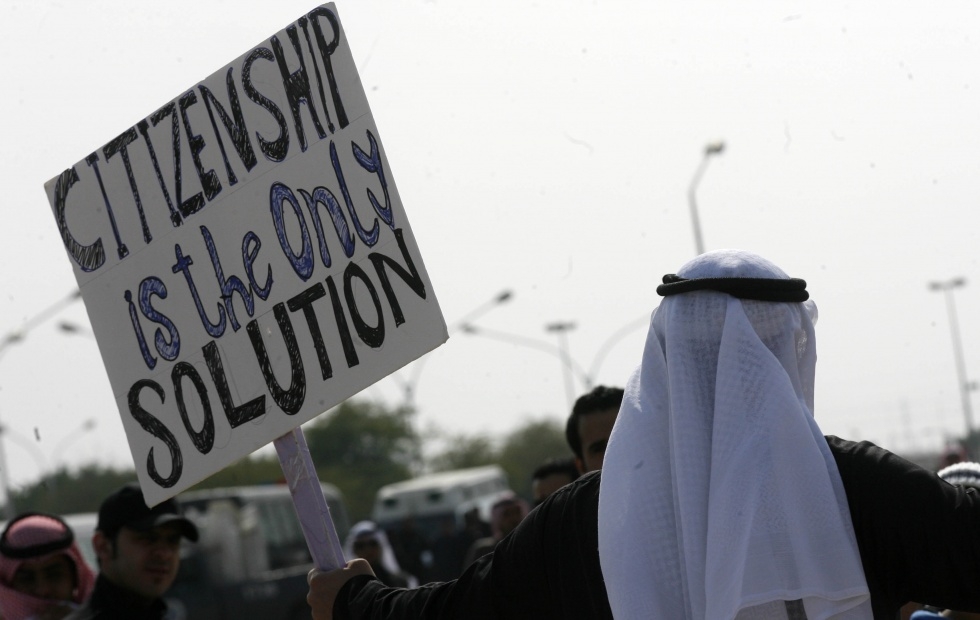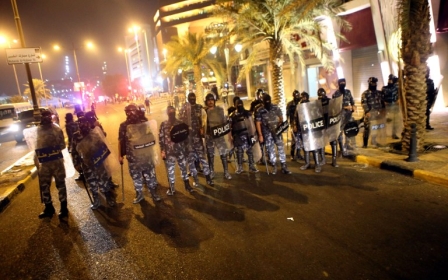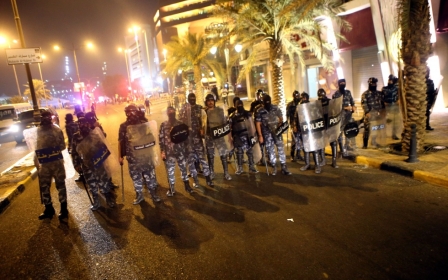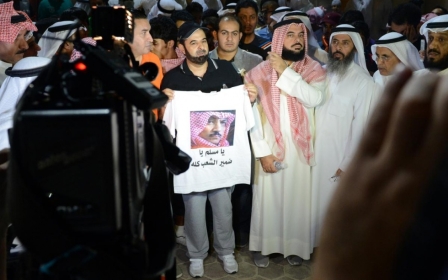Jailed Kuwaiti activist accuses government of targeting Bedoon for speaking out

Kuwait on Thursday sentenced a human rights activist to six months in prison for assaulting a police officer. The activist involved said he was denied a fair trial and accused police of beating him while in their custody.
Abdulhakim al-Fadhli, 38, is part of the Gulf State’s Bedoon community. Literally meaning “without” the Bedoon, who number anywhere between 80,000 and 250,000, do not have nationality in Kuwait despite many being from families who have resided in the Gulf State for decades.
Fadhli has accused authorities of using the justice system to try and silence his criticism of their alleged prejudice against Bedoon and said his conviction highlights a deteriorating situation for the stateless community in Kuwait.
“The Kuwaiti government was involved in the trial from the beginning to end,” he said. “I accuse them of direct interference in the decision of the judge to put me in prison, which I believe to be solely related to my human rights work and advocacy on the rights of Bedoon.”
Fadhli was convicted by the court on Thursday of assaulting a police officer on 7 July, when he was arrested while monitoring anticipated clashes between protesters and security services at the release of opposition leader Musallam Barak from prison.
He said that he was denied the opportunity to present his case fairly in court and accused authorities of not investigating his own allegations of assault.
“One of the pillars of a fair trial in any country is being able to raise and hear evidence. That did not happen to me. Police arrested and handcuffed me then a senior officer struck me eight times on the side of my face, bursting my right ear drum. The court did not allow me to bring witnesses to support my case and failed to investigate the police for beating me,” he said.
Fadhli is currently free but said he could be arrested at any time and taken to prison to serve the six month sentence. He has refused to hand himself over to authorities and said he will not do so until Sunday when his lawyer will submit an appeal against the conviction.
Moataz El Fegiery, protection coordinator at human rights group Frontline Defenders in Dublin, said a doctor had provided testimony of Fadhli’s injuries and supported his allegation that the trial was unfair.
“We witnessed government influence in Abdulhakim’s case, which is not uncommon in Kuwait,” he said. “We cannot say there is judicial independence, given this interference, and ultimately this makes it impossible for people to receive a fair trial.”
“We believe the trial was motivated by his human rights work, in particular his criticism of the situation for Bedoon. It [his conviction] serves as a message to the human rights community in Kuwait that they should not challenge authorities on the rights of Bedoon.”
Kuwaiti authorities have not commented on Fadhli’s allegations.
Deteriorating situation for Bedoon?
The Bedoon issue is divisive in Kuwait. Bedoon claim Kuwaiti nationality and authorities consider them illegal residents. The community originate from the time of independence in 1961 when their ancestors did not apply for nationality or lacked documentation – other members of the Bedoon include those who worked within the security forces in the 1960s and subsequently settled in Kuwait.
Over the years there have been intermittent laws passed that naturalised small numbers of Bedoon and authorities announced in March this year that a roadmap was forthcoming to solve the issue, however, it is unclear if this has materialised. In May authorities did meet with Comoros Islands officials to discuss granting citizenship to Kuwaiti Bedoon in exchange for “economic benefits”.
Bedoon reject the idea of accepting Comoros citizenship to legalise their status and remain committed to holding out for Kuwaiti nationality.
Large protests by Bedoon have sporadically broken out in Kuwait since the Arab Spring erupted in 2011. Authorities have consistently broken up these demonstrations and regularly been accused of beating protesters and torturing detainees – a charge they have denied.
For human rights activist Fadhli, the situation is becoming worse and he said pressure has been increasing on the Bedoon community.
“We are treated a cheap local workers,” he said. “Kuwaiti authorities implement apartheid policies against us – putting us in special residential areas, expelling us from public schools, not allowing us to work in public office.”
“After years of separating us from the rest of Kuwaiti society, they have begun to separate us from each other,” he added, referencing a three tiered identity card system authorities have implemented for Bedoon. “The government does not want to help us – be we help ourselves by protesting, striking, contacting international human rights organisations.”
Fadhli said the government’s Bedoon department recently moved to a new location in Qasr al-Nayif, which used to be “used for executions by hanging”. He said the choice of location was designed to send a message to the community that “we will kill you by cutting off every part of life from you.”
The Frontline Defenders’ Fegiery agreed that the situation has deteriorated for Bedoon in Kuwait and pointed to a trend of human rights activists being targeted due to their work.
“This year the government has started to withdraw nationality from citizens who speak out about human rights abuse,” he said. “There has not been any improvement in Kuwait, there are ever increasing risks for human rights defenders in carrying out their legitimate work.”
New MEE newsletter: Jerusalem Dispatch
Sign up to get the latest insights and analysis on Israel-Palestine, alongside Turkey Unpacked and other MEE newsletters
Middle East Eye delivers independent and unrivalled coverage and analysis of the Middle East, North Africa and beyond. To learn more about republishing this content and the associated fees, please fill out this form. More about MEE can be found here.




